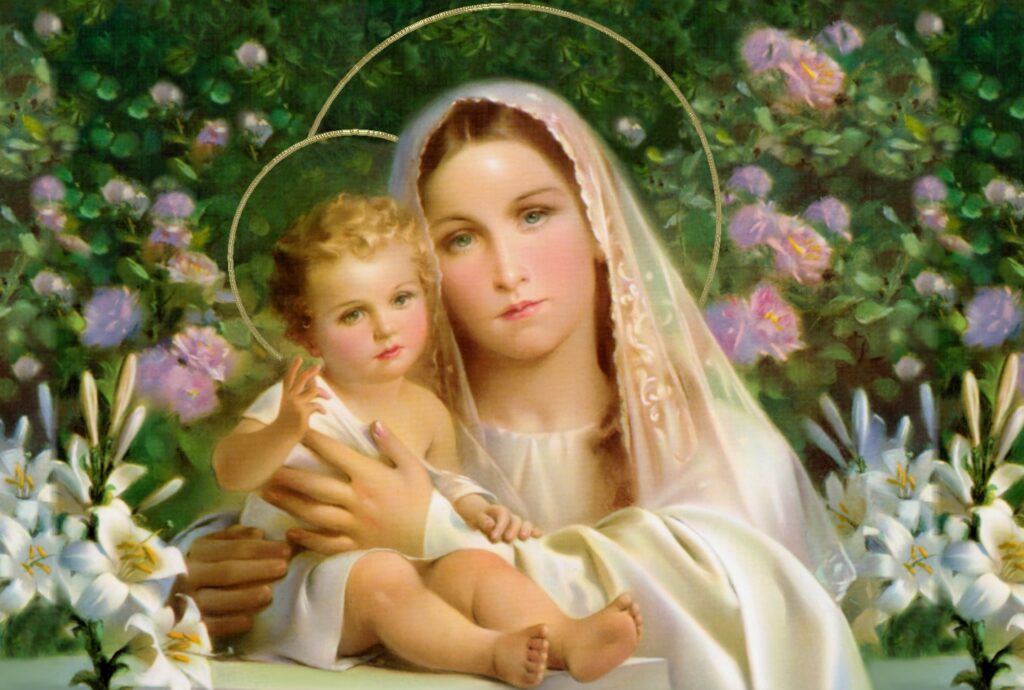THEME: MARY, MOTHER OF GOD
READINGS: Numbers 6:22-27 / Galatians 4:4-7/ Luke 2:16-21
Solemnity of Mary, Mother of God
The Holy Mass of New Year’s Day combines several thoughts together:
- To thank God for the gift of a New Year and to seek His blessings
- To advocate and pray for peace in the world
- Most especially, to celebrate the solemn feast of Mary as the Mother of God
The emphasis of this homily will be on the solemn feast.
THANKING GOD AND SEEKING HIS BLESSINGS
Every new day is a gift of God for which we should thank Him. A New Year, then, is a special gift which should elicit our heartfelt gratitude to God. As we thank Him, let us ask Him to accompany us with His blessings throughout the New Year. In this respect, let us claim His blessings of good health, protection, guidance, progress, deliverance, joy and peace in accordance with the words He gave to Moses:
“The Lord bless you and keep you;
the Lord make his face to shine upon you, and be gracious to you;
the Lord lift up his countenance upon you, and give you peace” (Num. 6:24-25).
Amen!
ADVOCATING AND PRAYING FOR PEACE
The above blessing formula ends by asking God to give us peace. The importance of peace is obvious because without it, no individual, nation or the world as a whole can make good progress. Hence, since 1968, our Church has dedicated 1st January as the World Day of Peace to promote the cause of peace. The Church, therefore, exhorts us to pray for peace in our life, our family, our nation and the world as a whole. Secondly, we are called upon individually and collectively to foster peace by promoting justice and charity.
MOTHERHOOD OF THE BLESSED VIRGIN MARY
According to today’s gospel reading, the Child Jesus was named on the eighth day after His birth (cf. Luke 2:21). With the birth of Jesus celebrated on 25th December, New Year’s Day becomes the eighth day. Now, the occasion for the naming of a baby is also a day to appreciate or congratulate the parents, most especially, the mother who carries and nourishes the child for nine months and endures the pains of delivery. Hence, the Church dedicates today to appreciate the Blessed Virgin Mary. Believing that Mary’s Child is the very Son of God, the Church appreciates that Mary has become the Mother of the Son of God or, simply, the Mother of God.
Now, long before the Church officially used the title of “Mother of God”, the Holy Spirit had inspired St. Elizabeth to call her then young cousin, Mary, “the Mother of my Lord” (Luke 1:43). And the circumstance in which St. Elizabeth made this proclamation makes the revelation of God’s favour on the Blessed Virgin Mary more amazing. That is, even before the Blessed Virgin Mary could narrate to her older cousin the good news she had received from the angel Gabriel, even before Mary had any external sign of pregnancy, Elizabeth could exclaim: “why is it that the Mother of my Lord should come to me” (Luke 1:43)?
Here, the title “Lord” is in reference to the divine; it is not a mere human title of honour as given to bishops, judges or kings. If the import of referring to Jesus as “Lord” is not evident to some people, the testimony of the doubting Thomas may settle the matter. When St. Thomas eventually saw the risen Lord Jesus, he did not simply say, “My Lord”, rather he exclaimed: “My Lord and my God!” (John 20:28).
That Jesus Christ is God is evident in many New Testament passages. However, may it suffice to refer to only the first chapter of St. John’s Gospel. This is the testimony of St. John: “in the beginning was the Word (Christ) and the Word (Christ) was with God. And the Word (Christ) was God” (John 1:1). Subsequently, at the appointed time, in order to save us, “the Word (Christ) became flesh (man) and dwelt among us” (John 1:14) through conception and birth by the Blessed Virgin Mary (Gal. 4:4-7).
Furthermore, it may be necessary to clarify that by referring to St. Mary as the “Mother of God”, we do not imply that she gave birth to the Son of God before the world was created. Not at all! Rather, what we mean is that when the eternal Son of God was to become man, it was St. Mary who conceived and gave birth to Him. Thus, on the one hand, St. Mary is honoured with the title of “Mother of God”, because of who Jesus Christ has always been: the Son of God. On the other hand, since Mary is human, this title informs us that our Saviour, though divine, became truly human (cf. Phil. 2:5-11).
Let us, now, conclude with some prayerful wishes for the New Year:
- May Christ, who though divine became human, bless us with His power as God! Amen!
- May He who gave His mother, Mary, to us as our mother (John 19:26-27), favour our families throughout the New Year, as He once blessed the couple at Cana (John 2:1-11), when His mother interceded! Amen!
Have a Happy New Year with God’s special blessings!
By Most Rev. John Kobina Louis
